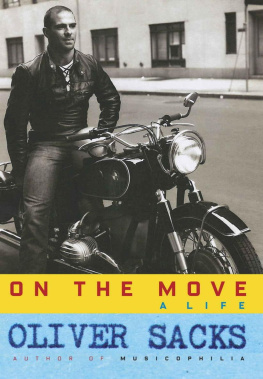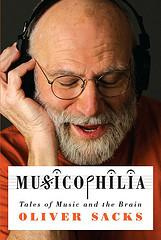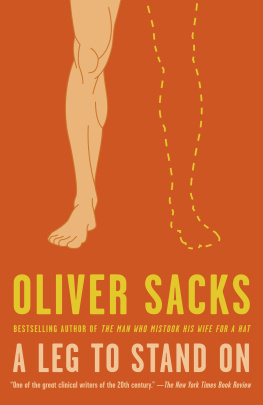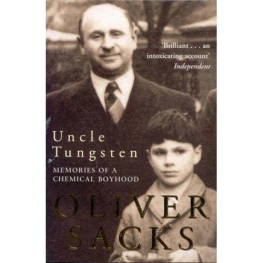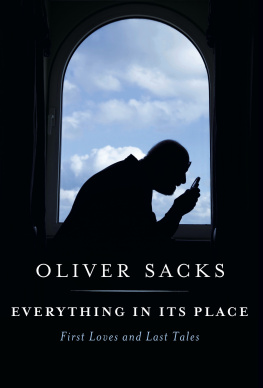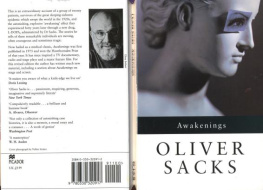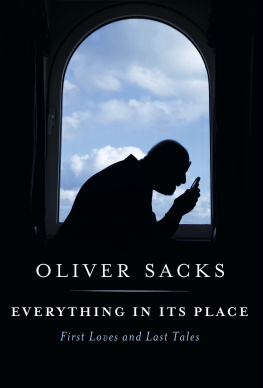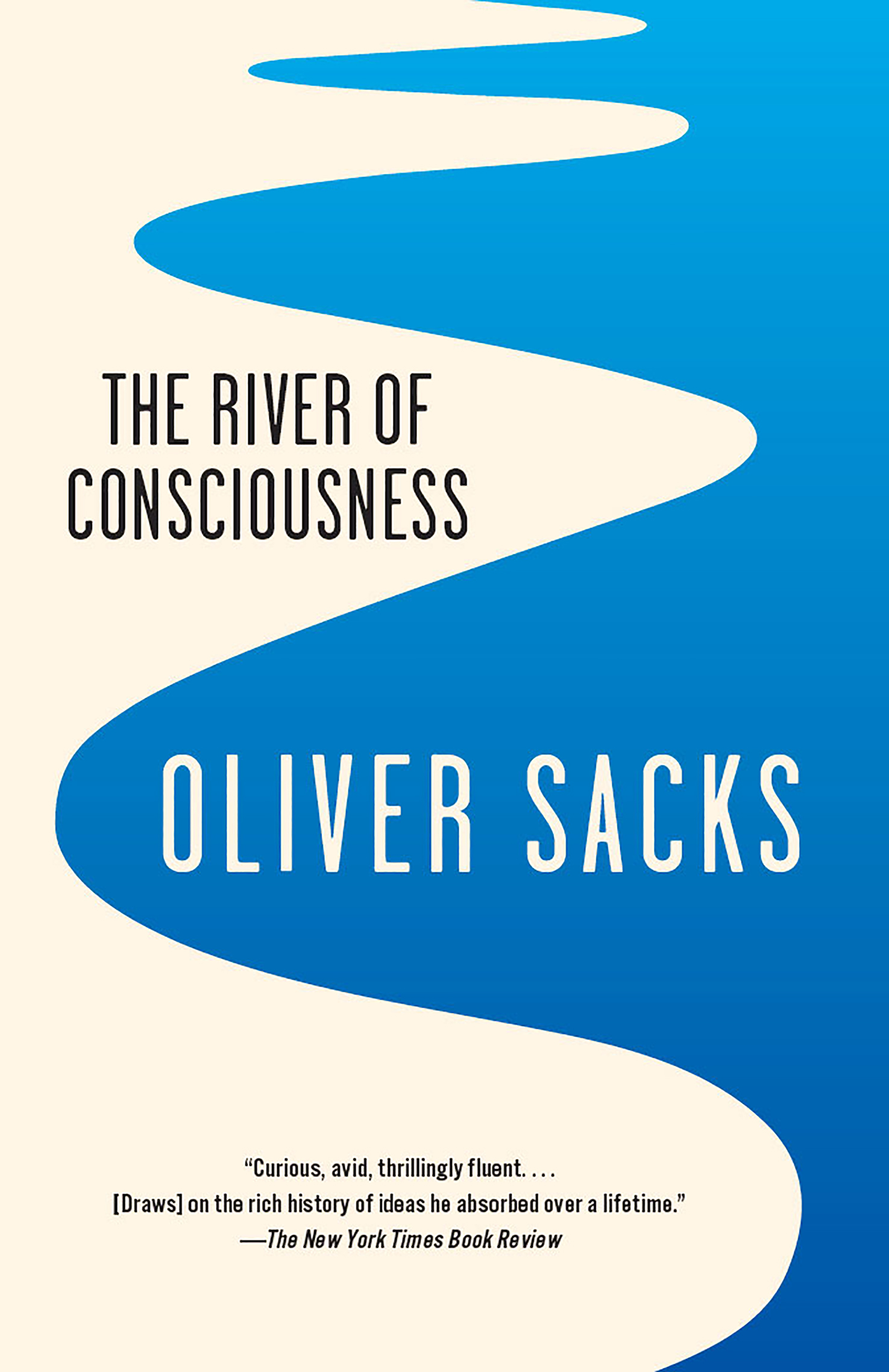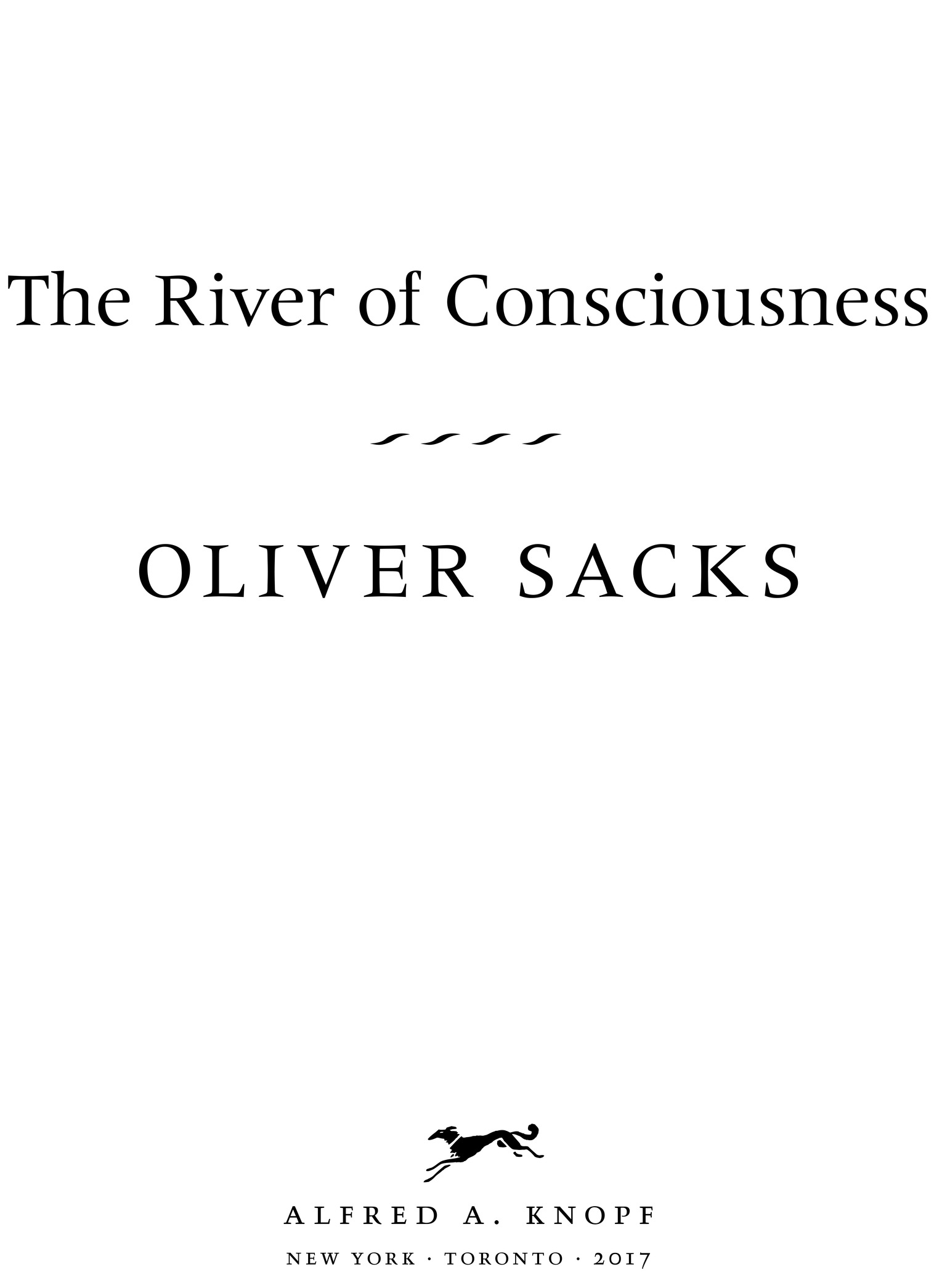ALSO BY OLIVER SACKS
Migraine
Awakenings
A Leg to Stand On
The Man Who Mistook His Wife for a Hat
Seeing Voices
An Anthropologist on Mars
The Island of the Colorblind
Uncle Tungsten
Oaxaca Journal
Musicophilia
The Minds Eye
Hallucinations
On the Move
Gratitude
THIS IS A BORZOI BOOK PUBLISHED BY ALFRED A. KNOPF AND ALFRED A. KNOPF CANADA
Copyright 2017 by the Oliver Sacks Foundation
All rights reserved. Published in the United States by Alfred A. Knopf, a division of Penguin Random House LLC, New York, and in Canada by Alfred A. Knopf Canada, a division of Penguin Random House Canada Limited, Toronto.
www.aaknopf.com
www.penguinrandomhouse.ca
www.oliversacks.com
Knopf, Borzoi Books, and the colophon are registered trademarks of Penguin Random House LLC. Knopf Canada and colophon are trademarks of Penguin Random House Canada Ltd.
Library of Congress Cataloging-in-Publication Data
Names: Sacks, Oliver, 19332015.
Title: The river of consciousness / by Oliver Sacks.
Description: New York : Alfred A. Knopf, 2017. | A Borzoi book. | Includes bibliographical references and index.
Identifiers: LCCN 2017000815 (print) | LCCN 2017001699 (ebook) | ISBN 9780385352567 (hardcover : alk. paper) | ISBN 9780385352574 (ebook)
Subjects: LCSH: Consciousness. | Neuropsychology. | Creative ability.
Classification: LCC QP411 .S23 2017 (print) | LCC QP411 (ebook) | DDC 612.8/233dc23
LC record available at https://lccn.loc.gov/2017000815
Library and Archives Canada Cataloguing in Publication
Sacks, Oliver, 19332015, author
The river of consciousness / Oliver Sacks.
Issued in print and electronic formats.
ISBN 978-0-345-80899-8
eBook ISBN 978-0-345-80901-8
1. Consciousness. 2. Neuropsychology. 3. Creative ability. I. Title.
QP411.S23 2017 612.8'233 C2017-901520-6
Ebook ISBN9780385352574
Cover illustration by Linda Huang
v4.1_r2
ep
Contents
For Bob Silvers
Foreword
T wo weeks before his death in August 2015, Oliver Sacks outlined the contents of The River of Consciousness, the last book he would oversee, and charged the three of us with arranging its publication.
One of many catalysts for this book was an invitation Sacks received in 1991 from a Dutch filmmaker to participate in a documentary television series called A Glorious Accident. In the final episode, six scientiststhe physicist Freeman Dyson, the biologist Rupert Sheldrake, the paleontologist Stephen Jay Gould, the historian of science Stephen Toulmin, the philosopher Daniel Dennett, and Dr. Sacksgathered around a table to discuss some of the most important questions that scientists investigate: the origin of life, the meaning of evolution, the nature of consciousness. In a lively discussion, one thing was clear: Sacks could move fluidly among all of the disciplines. His grasp of science was not restricted to neuroscience or medicine; the issues, ideas, and questions of all the sciences enthused him. That wide-ranging expertise and passion informs the perspective of this book, in which he interrogates the nature not only of human experience but of all life (including botanical life).
In The River of Consciousness, he takes on evolution, botany, chemistry, medicine, neuroscience, and the arts, and calls upon his great scientific and creative heroesabove all, Darwin, Freud, and William James. For Sacks, these writers were constant companions from an early age, and much of his own work can be seen as an extended conversation with them. Like Darwin, he was an acute observer and delighted in collecting examples, many of which came from his massive correspondence with patients and colleagues. Like Freud, he was drawn to understand human behavior at its most enigmatic. And like James, even when Sackss subject is theoretical, as in his investigations of time, memory, and creativity, his attention remains on the specificity of experience.
Dr. Sacks wished to dedicate this book to his editor, mentor, and friend of more than thirty years, Robert Silvers, who first published a number of the pieces gathered here in The New York Review of Books.
Kate Edgar, Daniel Frank, and Bill Hayes
Darwin and the Meaning of Flowers
W e all know the canonical story of Charles Darwin: the twenty-two-year-old embarking on the Beagle, going to the ends of the earth; Darwin in Patagonia; Darwin on the Argentine pampas (managing to lasso the legs of his own horse); Darwin in South America, collecting the bones of giant extinct animals; Darwin in Australiastill a religious believerstartled at his first sight of a kangaroo (surely two distinct Creators must have been at work). And, of course, Darwin in the Galpagos, observing how the finches were different on each island, starting to experience the seismic shift in understanding how living things evolve that, a quarter of a century later, would result in the publication of On the Origin of Species.
The story climaxes here, with the publication of the Origin in November 1859, and has a sort of elegiac postscript: a vision of the older and ailing Darwin, in the twenty-odd years remaining to him, pottering around his gardens at Down House with no particular plan or purpose, perhaps throwing off a book or two, but with his major work long completed.
Nothing could be further from the truth. Darwin remained intensely sensitive both to criticisms and to evidence supporting his theory of natural selection, and this led him to bring out no fewer than five editions of the Origin. He might indeed have retreated (or returned) to his garden and his greenhouses after 1859 (there were extensive grounds around Down House, and five greenhouses), but for him these became engines of war, from which he would lob great missiles of evidence at the skeptics outsidedescriptions of extraordinary structures and behaviors in plants very difficult to ascribe to special creation or designa mass of evidence for evolution and natural selection even more overwhelming than that presented in the Origin.
Strangely, even Darwin scholars pay relatively little attention to this botanical work, even though it encompassed six books and seventy-odd papers. Thus Duane Isely, in his 1994 book, One Hundred and One Botanists, writes that while
more has been written about Darwin than any other biologist who ever lived[he] is rarely presented as a botanist.The fact that he wrote several books about his research on plants is mentioned in much Darwinia, but it is casual, somewhat in the light of Well, the great man needs to play now and then.
Darwin had always had a special, tender feeling for plants and a special admiration, too. (It has always pleased me to exalt plants in the scale of organised beings, he wrote in his autobiography.) He grew up in a botanical familyhis grandfather Erasmus Darwin had written a long, two-volume poem called The Botanic Garden, and Charles himself grew up in a house whose extensive gardens were filled not only with flowers but with a variety of apple trees crossbred for increased vigor. As a university student at Cambridge, the only lectures Darwin consistently attended were those of the botanist J. S. Henslow, and it was Henslow, recognizing the extraordinary qualities of his student, who recommended him for a position on the


